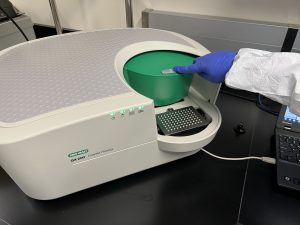Study launched to gain approval to use ddPCR for measuring sewage spills, fecal contamination at beaches in City of Los Angeles

SCCWRP and the City of Los Angeles have begun working to earn regulatory approvals to use a rapid, DNA-based method for detecting fecal contamination at City beaches – an advance that would enhance the City’s ability to reopen beaches as soon as safely possible following sewage spills.
The study, launched in August, will compare the performance of the droplet digital polymerase chain reaction (ddPCR) method to traditional bacteria culturing methods for detecting fecal contamination in beach water. The ddPCR method, which SCCWRP and its member agencies have spent nearly two decades vetting and optimizing, enables public health agencies to notify beachgoers about contamination on the same day that water samples are collected. The soonest traditional methods can be used for beach closure and reopening decisions is the day after sampling.
Although the City is not planning to replace culturing methods with ddPCR for routine testing, the City would be granted this option following successful completion of the method comparison study.
In 2022, San Diego County became the first municipality in the nation to end reliance on culturing methods altogether in favor of using the ddPCR method across more than 50 beach locations.
More news related to: Microbial Risk Assessment, Microbial Water Quality